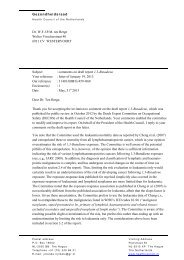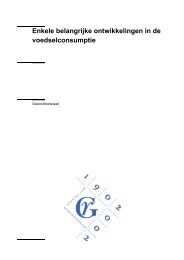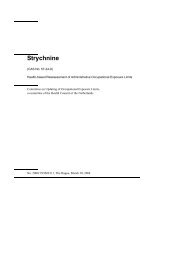Health Council of the Netherlands Reports 2003 - Gezondheidsraad
Health Council of the Netherlands Reports 2003 - Gezondheidsraad
Health Council of the Netherlands Reports 2003 - Gezondheidsraad
Create successful ePaper yourself
Turn your PDF publications into a flip-book with our unique Google optimized e-Paper software.
First, health care must be readily accessible to all. A ‘solidary’ insurance<br />
package is funded on <strong>the</strong> basis <strong>of</strong> solidarity <strong>of</strong> rich with poor, young with old,<br />
and healthy with sick. It includes all <strong>of</strong> <strong>the</strong> care services for which mutual<br />
solidarity can reasonably be invoked. This first objective requires criteria for a<br />
‘solidary’ package.<br />
Second, government should protect its citizens against <strong>the</strong>ir own ill-advised<br />
decisions and those <strong>of</strong> o<strong>the</strong>rs. This objective requires criteria for a ‘compulsory’<br />
package.<br />
Criteria for a solidary package<br />
For which services are people willing to exercise solidarity with one ano<strong>the</strong>r?<br />
Based on an analysis <strong>of</strong> earlier attempts (at home and abroad) to develop<br />
effective criteria in this regard, <strong>the</strong> Committee considers that, in <strong>the</strong>ory,<br />
individual ‘burden <strong>of</strong> disease’ combined with ‘cost-effectiveness’ forms a good<br />
basis upon which to define a basic package that, in accordance with <strong>the</strong> principle<br />
<strong>of</strong> solidarity, is accessible to all. Burden <strong>of</strong> disease is defined as ‘reduced quality<br />
<strong>of</strong> life or life span as a result <strong>of</strong> a disease or some o<strong>the</strong>r somatic or mental health<br />
problem in cases where no health care service would be utilized’. The term costeffectiveness<br />
denotes <strong>the</strong> relationship between <strong>the</strong> effectiveness <strong>of</strong> a health care<br />
service (i.e., <strong>the</strong> degree <strong>of</strong> reduction in burden <strong>of</strong> disease) and <strong>the</strong> costs (in terms<br />
<strong>of</strong> financial resources, manpower, equipment and time). Thanks in part to <strong>the</strong><br />
major advances made in scientific research in recent years, ‘burden <strong>of</strong> disease’<br />
and ‘cost-effectiveness’ are, in <strong>the</strong>ory, workable criteria that have in <strong>the</strong><br />
meantime also been applied in a number <strong>of</strong> situations. However, we currently<br />
still lack <strong>the</strong> data needed in order to apply <strong>the</strong>se criteria to many care services.<br />
Criteria for a compulsory package<br />
For which services is compulsory insurance justifiable?<br />
Burden <strong>of</strong> disease and cost-effectiveness are not sufficient conditions for this.<br />
Additional reasons are required. One can decide on paternalistic grounds to<br />
protect individuals against self-made decisions that may prove to have adverse<br />
consequences in <strong>the</strong> longer term. An example <strong>of</strong> this would be failure to take out<br />
insurance for an expensive service that one would not expect to need. Ano<strong>the</strong>r<br />
motivation for compulsory insurance is to protect individuals against<br />
unfavourable decisions made by o<strong>the</strong>rs – for example, if <strong>the</strong>se o<strong>the</strong>r parties fail to<br />
insure against prevention and care <strong>of</strong> infectious diseases. A third reason is to<br />
22 <strong>Health</strong> <strong>Council</strong> <strong>of</strong> <strong>the</strong> Ne<strong>the</strong>rlands; <strong>Reports</strong> <strong>2003</strong>

















